As a freshman at the University of Texas (Fall 1971 and Spring 1972), my head was spinning. I had serious doubts about whether I could compete, academically and socially, and had no direction to speak of. In such a confused and insecure state, I crossed paths with Paul Alexander. We both had rooms on the first floor of the men’s wing of Jester Dormitory and, by coincidence, we were both Dallas natives; he had been a student at Samuell, whereas I graduated from Bryan Adams.
I believe it was Chip Harris or Gary Cox (two more Dallasites, both hailing from Thomas Jefferson) who introduced us. Another TJ alumnus also living at Jester was John Collins. His reaction to meeting Paul was much the same as mine: “One of the more sobering instances in my life [was] going to Chip or Gary’s room and seeing a withered human confined to an iron lung. A lifestyle that I could only imagine for a few seconds; it was too horrific to stay much longer.”
Allow me to summarize Paul’s painful and yet very admirable life. He was born in 1946, the son of a Greek father and a Lebanese mother. His ethnic roots notwithstanding, he turned out to have light skin, blond hair and blue eyes. A smart, healthy and active boy, he was out in the back yard playing with his brother on a hot and rainy day in July 1952. That was when Paul somehow contracted the polio virus—1952 being the peak of the polio epidemic that affected 58,000 people, left more than 21,000 with varying degrees of disability and 3,100 dead. Paralyzed from the neck down, he was rushed to Parkland Hospital and placed in a negative-pressure ventilator, known colloquially as an “iron lung.” This seven-foot-long contraption stimulates breathing: air into the lungs, air out. Paul was at Parkland for 18 months before being sent home by a doctor who did not expect him to live much longer, but he proved the medical man wrong.
He would live inside of it for the next 72 years, eventually earning recognition from the Guinness Book of World Records for having spent the most time in an iron lung. In an autobiography he later wrote, he called this both his cage and his cocoon, his enemy and his friend. In fact, with the help of a physical therapist, he learned a technique called glossopharyngeal breathing which allowed him to leave the iron lung for a few minutes and eventually up to a few hours. But he slept in it every night.
Early in this agonizing time, young Paul made a conscious decision not to give in to despair and self-pity, but to fight or at least survive. He was one of the first students in Dallas Independent School District history to be home-schooled, although he was technically enrolled at a nearby elementary school, followed by Hood Junior High and then Samuell. It was far from easy, but he became an artist of sorts by holding a paintbrush between his teeth. He read voluminously and could absorb information far better than most able-bodied kids. As he later told an interviewer, “I knew if I was going to do anything with my life, it was going to have to be a mental thing. I wasn’t going to be a basketball player.” Salutatorian of the 1967 Samuell class, he earned a scholarship to SMU. This was long before passage and implementation of the Americans with Disabilities Act (1990), and some of the people—fellow students, teachers, administrators—frankly did not want a student being pushed around campus and into classrooms in an ungainly machine that wheezed and sighed nonstop.
After three years as a Mustang, Paul decided he would rather be a Longhorn. He transferred to UT and got set up in Jester, which was where we met. I did not know at that time that the person who had agreed to give him around-the-clock care had bailed. So Chip, Gary and a few other good-hearted young men came to the rescue. Here I must make a woeful confession. One day, we were in his room, just the two of us. A good talker and a good listener, he revealed that “I make love to a girl differently from you.” I did not wish to delve further into that matter. Paul then asked me, in a most roundabout way, whether I would consider being one of his caretakers. Just as obliquely, I demurred. I was, to be blunt, selfish and immature. I was not about to shave Paul, brush Paul’s teeth, prepare Paul’s food, change Paul’s undies, wheel Paul to class and so forth. An older and wiser me realizes that this would not have impoverished my life—it would have enriched it. When I recounted the tale to my You Me colleague Jeong-jin Lee here in Seoul, confessing how I had turned Paul down, she told me, “There’s a fine line between guilt and shame.” True. If not quite guilty, I remain ashamed.
Paul got his bachelor’s degree in 1978, entered UT Law School and earned a Juris Doctor in 1984, passing the bar in 1986. His journey through American higher education had been slow and tedious: A total of 10 years at SMU and UT, and another six for law school. He just would not quit. He passed the bar and taught legal terminology to court stenographers before returning to Dallas. Paul opened up a one-man firm, handling family law and financial cases. He represented clients in court wearing a three-piece suit and sitting in a modified wheelchair.
During the 30 years he practiced law, Paul was not just earning a living. He was involved in all sorts of activities to facilitate the lives of disabled people. As only one example, if he wanted to attend a movie or eat at a certain restaurant, he went there. If no place could be found for him and his iron lung or at least his wheelchair, he demanded—loudly—that provisions be made.
A type 1 diabetic and legally blind woman named Kathy Mary Gaines was Paul’s longest-serving and most reliable caretaker, giving him 35 years of service. She was there when he closed up his law office due to gathering health problems and helped with his aforementioned autobiography. She enabled Paul to attend his local Greek Orthodox Church, to serve as an ambassador for Rotary International and to become adept at social media (330,000 followers on TikTok, for instance). He was the subject of numerous articles and videos, and it does not surprise me that the New York Times, the Washington Post, the Guardian, the Dallas Morning News and other major publications noted his passing on March 11 because of complications from Covid-19. Of course, he has a Wikipedia page.
Had Dr. Jonas Salk developed his polio vaccine just three years earlier, Paul would have gotten a shot along with thousands of other Dallas-area kids, remained able-bodied and not faced such monumental challenges. But circumstances forced him to cope, to live day to day—indeed moment to moment—and to make his own way in the world. His life was a testament to the human spirit, and I am honored to have ever known him.
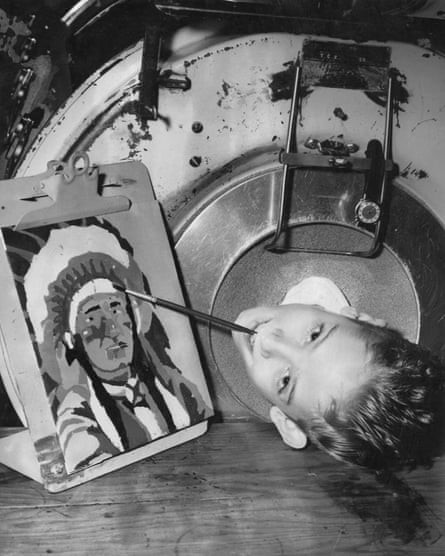
Paul (then 9 years old) paints…
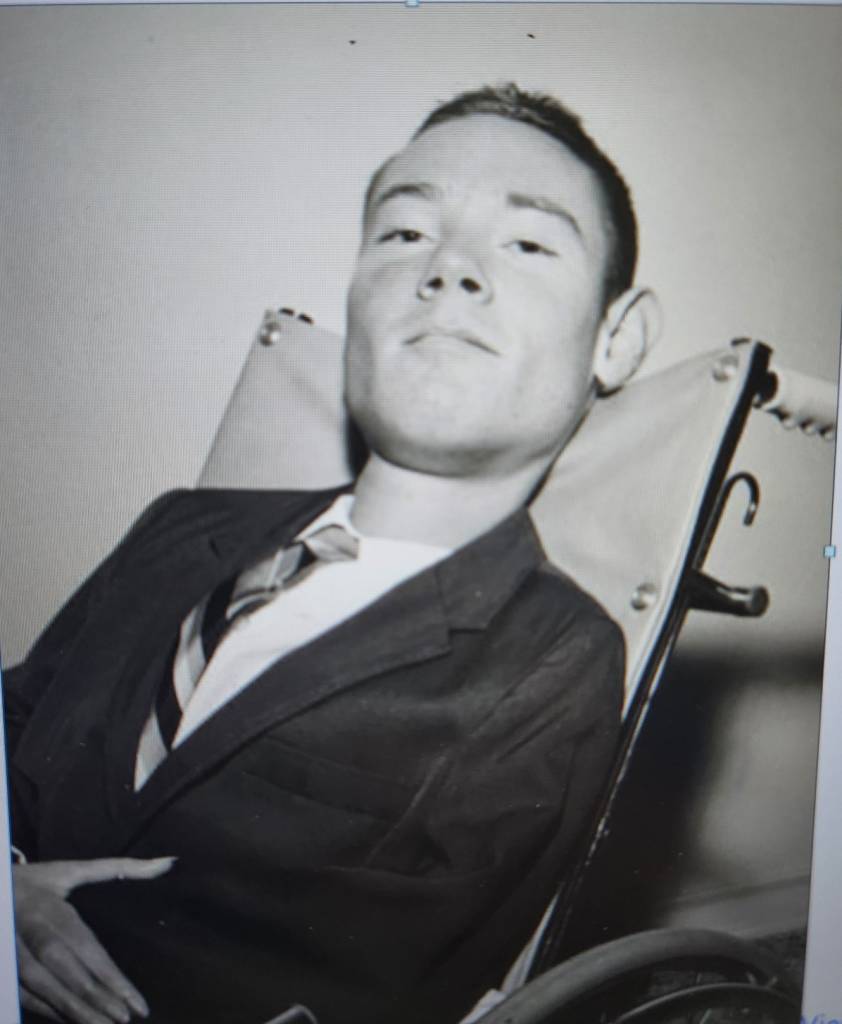
Paul as an attorney…
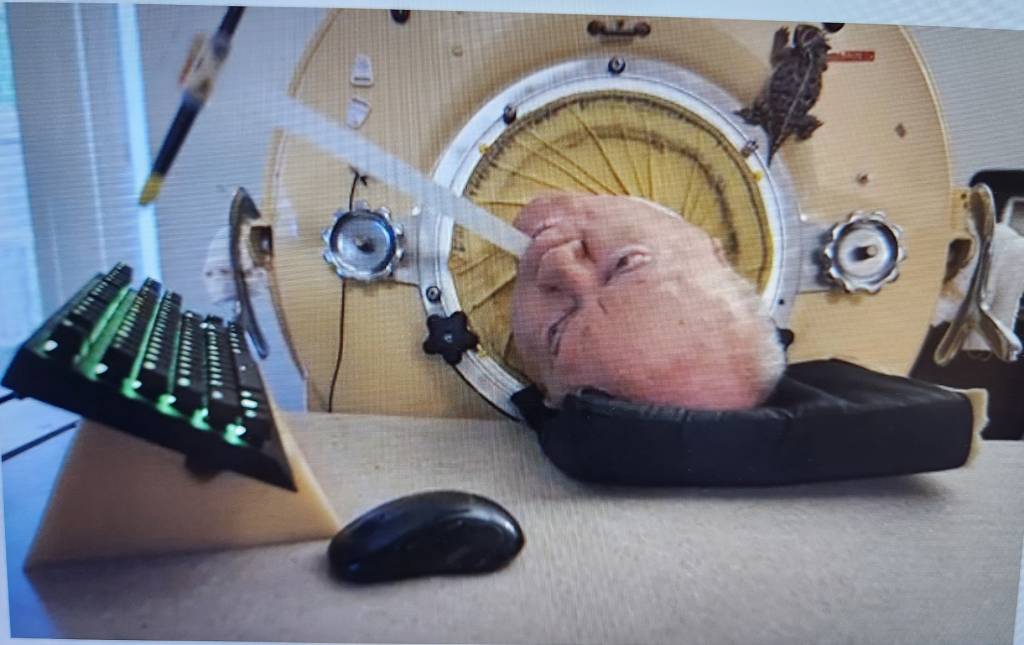
Paul writes…
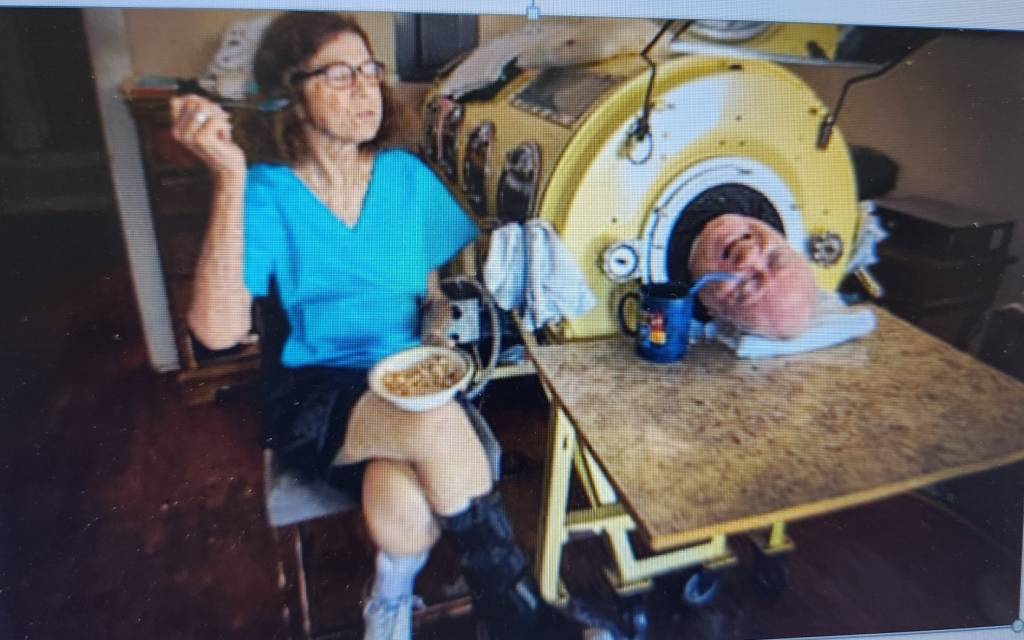
Paul with Mary Kathy Gaines…

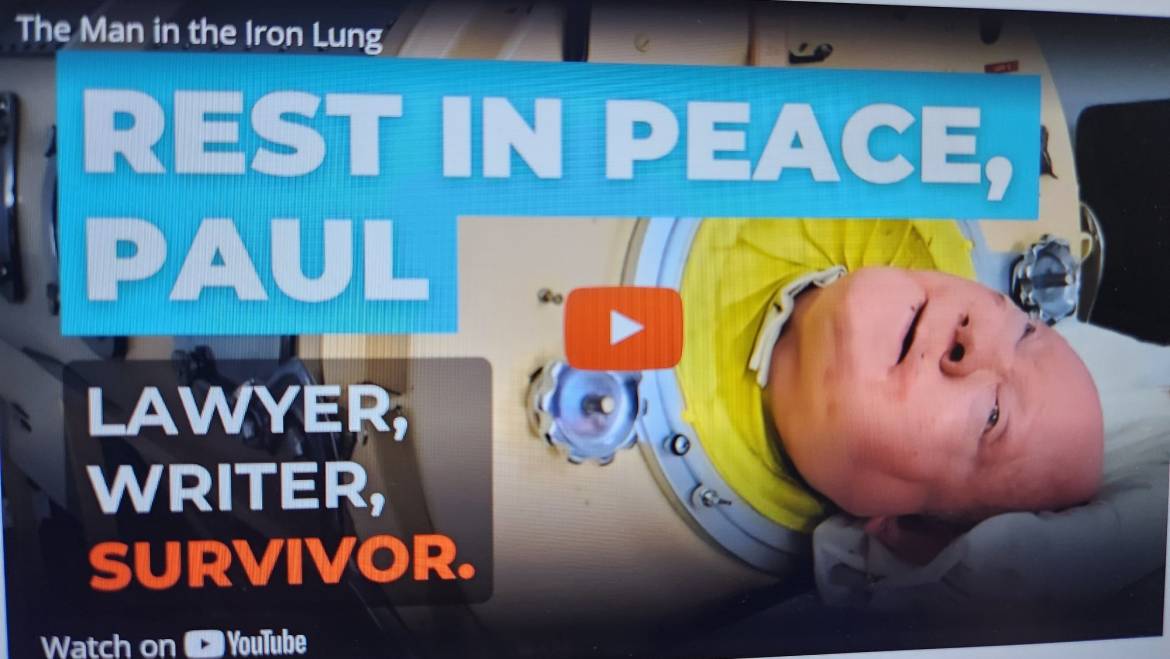
3 Comments
My, what a small world. I read about him in the newspaper in Dallas recently when they were reporting on his life and then his obituary…and all that time you knew him….I was in total amazement at his life…every respect…he was truly someone who overcame and gave back… I finished reading about him and was inspired…and now with your first hand knowledge of him as reported in this story, this man’s story is even more inspiring…such tenacity…and he never gave up….and moreover, with these same circumstances, the vast majority of us would have felt hopeless..
As to being one of his caretakers or not, resist this retrospective look back to him alone…rather, I would look retrospectively and see whose lives you have touched and impacted where no one else could have…like Paul, you have impacted the world…I think you were the one that was blessed to pay it forward… why do I say this?…consider all the situations and opportunities that you have accepted as your own calling… to become a friend to someone in need… I think of several examples of where you stepped up… for instance, what about the young man in the Philippines that you supported him selflessly and provided him with a dwelling that was closer to school…. or what about all those students that you tutored after hours in order to equip them to succeed when they came to the USA for higher education opportunities… or even those persons whom you honored annually at Christmas time with gifts and accolades who were in housekeeping at your former place of employment… and your devotion to your cousin in Big Springs…… this list goes on and on…
Great article
Thanks Richard for bringing the person Paul in the DMN obituary to life for me. I have had two good friends who spent their late teens and adult lives in wheelchairs as quadriplegics. Jerry broke his neck at age 18 diving into the floating rope divider between the deep and shallow pool ends. His high school girlfriend Sherry married him in his wheelchair and cared for him for over 20 years. Jerry lived a resentful and bitter life with constant cursing and demands of his devoted wife and young daughter. Eventually after 20 years his wife left him and he died resentful and alone. My other friend Brent chose a different response. He was gradually overtaken by muscular dystrophy in his later teens losing his lung capacity forcing him to give up his passion playing harmonica in Deep Ellum clubs with passing blues artists (BB King, Muddy Waters, Buddy Guy, Vaughn Brothers). He remained a devoted husband for over 20 years. Brent ran an organizing business using a pencil with a rubber eraser on each end clinched in his teeth to dial clients on a new technology push button telephone all day and keep records on a newly invented PC. He was a voracious reader and religious scholar teaching Sunday classes from his wheelchair while turning pages with his rubber tipped pencil in his mouth as he referenced scripture verses. Your experience with Paul observing the capacity of the human spirit causes me to reflect on the choices I make in response to challenges faced. What is the character of my spirit? When and how will it be tested again?
Take care my Friend! Great work.
Thank you for sharing Paul’s life. Yes, what a character he got. Strong willed despite and in spite of the circumstances he faced. I wonder if i can ever get just a pinched of his courage and positivism.
Add Comment